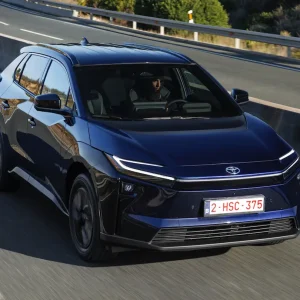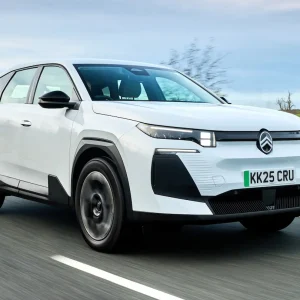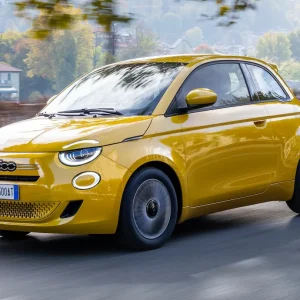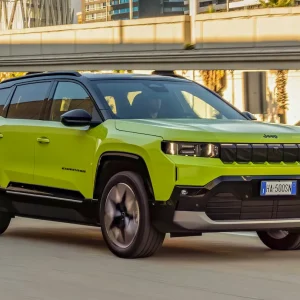A sea change came in the baby van sector with the introduction of the high cube Fiat Fiorino and the equivalent Citroen Nemo and Peugeot Bipper products in 2008.
These vans raised the bar in terms of payload capacity and load space when they emerged, and with traditional car-derived vans such as the Ford Fiesta van seemingly becoming marginalised as more practical, purpose-built alternatives enter the market, the Blue Oval has now got around to taking them on at their own game.
Ford claims the Transit Courier will offer best-in-class fuel efficiency and load space while, when it comes to payload, its 660kg capacity matches the Bipper and Nemo and exceeds the Fiorino’s 610kg limit. Another rival on Ford’s radar, Mercedes’ Citan Compact, has a payload of just 490kg.
However, the Fiat, Citroen and Peugeot trio, along with Mercedes, may dispute Ford’s claim on loadspace because while the Courier can accommodate 2.3m3 behind the bulkhead, the Fiorino, the Nemo and Bipper cite load volume of 2.5m3, while the Citan Compact provides 2.4m3. Ford, though, draws attention to load-carrying features such as an optional mesh bulkhead and fold-dive passenger seat that can increase load volume to 2.6m3 and enable the Courier to carry longer items of up to 2.59m.
The Transit Courier is available as a panel van and as a passenger-carrying Kombi, with two trim levels (Base and Trend) and with three engines: two diesels – 95hp 1.6 and a 75hp 1.5 units – as well as Ford’s 1.0-litre Ecoboost petrol engine. Ford claims its most frugal engine, the 1.6 diesel, achieves 97g/km CO2 and 76.3mpg on the combined cycle when equipped with auto stop-start and a 62mph speed limiter.
The most economical figure quoted by the competition, excluding the car-derived Vauxhall Corsavan and Ford’s own Fiesta Van, which have both cut emissions to below 90g/km and achieve official figures over 80mpg – as does Fiat’s Punto Van – is for the Peugeot Bipper 1.3 HDI 75 EGC with CO2 of 109g/km and 68.9mpg.
When it comes to prices, the Courier starts at £11,045 for the Base spec van, which is available with either the 1.0-litre Ecoboost or the 75hp 1.5 diesel. This represents a £140 hike over the cheapest entry-level opposition van, the Bipper 1.3 HDI 75.
We tested the Courier with the 95hp 1.6 diesel engine that is only offered with the higher-level Trend specification. Our vehicle was also fitted with auto stop-start for an additional £150.
Like the rest of the Courier range, this model comes with five-speed manual transmission. The load bay is accessed via twin rear doors, which open to 90° and can swing through to 180°, although the clips to enable them to do so were a little flimsy, which was surprising considering the high standard and toughness of the fittings and fixtures overall. There is also a sliding near-side door to offer a more convenient way to load and unload the van when parked at the kerb side.
The build quality is first rate and once on the road there are no irritating rattles and squeaks. Wind and road noise is kept to a relaxing minimum and the bulkhead cuts out sound interference from the rear.
The Courier’s interior is stylish, user-friendly and at least a match for the best currently on the market, while Ford has made the most of the limited space available to provide decent stowage facilities.
Trend models get DAB radio with CD as well as Ford Sync with Emergency Assist in addition to the Bluetooth and USB that comes as standard. The van we drove was also furnished with a five-inch touch screen with satellite navigation, air-conditioning and a rear-view camera that comes as part of a pack for £650.
We drove the van with a half-load on board and while this may have contributed to its excellent ride quality by minimising bounciness, it did not appear to inhibit the eagerness of its performance. The van is smooth and comfortable on long journeys, belying its compact dimensions, and Ford promises the ride is equally refined when the van is unladen. On winding roads or in busy city streets, sharp steering and a snappy gear change result in agile handling and excellent manoeuvrability.
Ford is deploying its Courier engines in the model line-up for the UK to target specific customer groups. The 1.0 petrol Ecoboost engine is available in Base and Trend vans, the 75hp 1.5 diesel is offered in Base and Trend vans and in Kombi mode, and the 95hp 1.6 diesel is placed only in the Trend van.
Mark Easton, LCV product manager, Ford of Britain, says the strategy reflects the likelihood that big fleets will opt for the 75hp van while user choosers and small operators will go for the 95hp diesel. He reckons the Ecoboost will take a modest 5% of the sales mix with the Kombi chipping in with 1-2%.
Ford is predicting class-leading whole-life costs for the Transit Courier. Taking KwikCarcost’s forecast for a 75hp 1.5 diesel with a starting price of £14,305 at 48 months with 20,000 miles per annum, it expects a 20% residual value of £2813. It claims this equates to a saving of £1627 over the Peugeot Bipper 1.3 75 S, £1207 against the Citroen Nemo 1.3 875 X, £1787 versus the Fiat Fiorino Cargo 1.3 Multijet 75, and £3461 compared with the Mercedes Citan 108 Compact 1.5 75, which, although predicted to be worth £2833 after four years, has the highest starting price in the group of £16,374.





